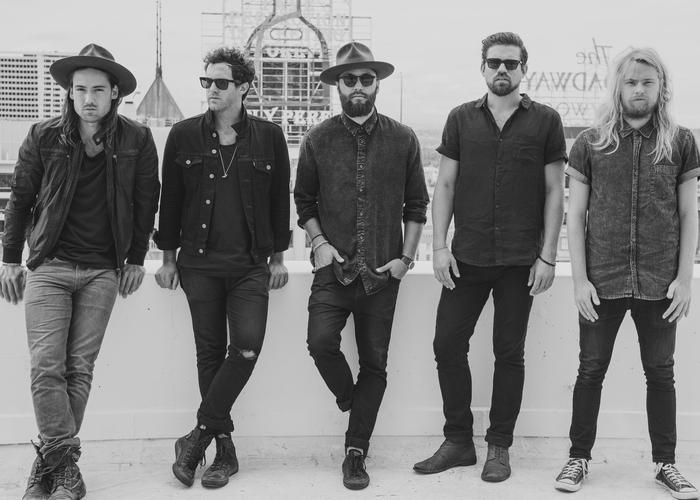Since their very first days as a band, members of the Venice, California-based alt-rock quintet Grizfolk have made full use of their disparate origins and distinct sensibilities. Drawing on wide-ranging backgrounds both musical and geographical — frontman Adam Roth, bassist Brendan Willing James, and drummer Bill Delia hail from different corners from the U.S., while keyboardist Sebastian Fritze and guitarist Fredrik Eriksson come from opposite coasts of Sweden — the band textures its songs with a heady mix of graceful melody, sprawling guitar work, and lush but edgy electronics. And on their debut album Waking Up The Giants, Grizfolk deliver an arena-ready sound honed partly through recent tours with artists like Bastille and X Ambassadors, while steadily building a warm, intimate mood that echoes the closeness of their collaboration.
Mainly self-produced and recorded everywhere from the band members’ living rooms to the ...
Show the rest
Since their very first days as a band, members of the Venice, California-based alt-rock quintet Grizfolk have made full use of their disparate origins and distinct sensibilities. Drawing on wide-ranging backgrounds both musical and geographical — frontman Adam Roth, bassist Brendan Willing James, and drummer Bill Delia hail from different corners from the U.S., while keyboardist Sebastian Fritze and guitarist Fredrik Eriksson come from opposite coasts of Sweden — the band textures its songs with a heady mix of graceful melody, sprawling guitar work, and lush but edgy electronics. And on their debut album Waking Up The Giants, Grizfolk deliver an arena-ready sound honed partly through recent tours with artists like Bastille and X Ambassadors, while steadily building a warm, intimate mood that echoes the closeness of their collaboration.
Mainly self-produced and recorded everywhere from the band members’ living rooms to the famed Sunset Sound studio, Waking Up The Giants takes its title from the album’s epic centerpiece. “There’s that cautionary phrase about being careful not to wake the sleeping giant, but we’re kind of going for the opposite of that,” says James. “We’re saying, ‘Let’s not be scared, let’s wake the damn thing up and make some waves in the world.’” Offering anthem after anthem, Waking Up The Giants never shies away from emotional truth, but ultimately inspires a deep and powerful sense of hope. “The lyrics in ‘Waking Up The Giants’ can relate back to anyone who might have an idea that they’re afraid to express, but that might spark something that winds up changing their life for the better,” says Roth.
With its sweeping, cinematic feel, Waking Up the Giants came to life by way of a songwriting approach that Grizfolk describe as visually oriented. “A lot of the time when we’re writing, we’re picturing some sort of landscape and inserting story and characters into it, and then creating the song from there,” says Fritze. “They’re often stories of people traveling, not having a destination, living in the moment wherever they are right now instead of trying to go off and find something better.” On the album-opening “Into the Barrens,” for instance, Roth assumes the role of “a lonely wolf wandering,” his soulful vocals set against a cascade of surging rhythms and hypnotic synth. From there, Grizfolk slips into the heavy groove and gritty guitar of lead single “Troublemaker” (a track written on the road and inspired by “the thought of someone who’s so good you just want a promise that she’ll still be there when you get back home — although it never really works out like that,” explains Roth). On “Bob Marley,” Waking Up the Giants serves up the consummate driving song, complete with whistled melody, surfy drumbeats, spaghetti-western guitar tones, and a touch of reckless romanticism. And on tracks like “Bohemian Bird,” Grizfolk show a softer side without losing any intensity, fusing stark beats, spectral guitar lines, and hushed harmonies to stunning effect.
Formed in 2013, Grizfolk marks a new era for a group of musicians who have devoted much of their lives to various musical pursuits: Roth, James, and Delia were previously bandmates in an L.A.-based Americana act, Eriksson has played in rock bands since he was 13, and Fritze got into beatmaking while studying music production in college. With its roots in an old nickname of Roth’s (“Griz Adams”), the band’s moniker refers to “folk not as a genre, but as in the idea of a community of people working together,” explains Fritze. To that end, Grizfolk began as a laid-back but earnest attempt at creating a fresh new hybrid of electronic music and rock. “It started off as fun experiment to see how we could bring in different musical styles and make something that we all love,” recalls Eriksson. “But then it worked within the first few songs, so we kept going with it.”
Those early songs include “The Struggle,” a track that earned Grizfolk some online buzz as well as airplay on radio stations across the country soon after its release in late 2013. That year, the band headed out on tour as the opening act for Chicago-based singer/songwriter Andrew Belle and ended up landing a deal with Virgin Records. By the following spring, Grizfolk had made their Virgin Records debut with an EP titled From the Spark and had their song “Way Back When” selected for the end-title sequence of DreamWorks Animation’s feature film Mr. Peabody & Sherman. The band also saw RAC’s remix of “The Struggle” hit the number-one spot on Hype Machine, and garnered praise from the likes of L.A. Weekly (who noted that Grizfolk “evokes dreamy notions of the epic West that sound like they’re coming from both the past and the future”) and KCRW (who praised the group for “pushing the possibilities of pop”).
Hide the rest















